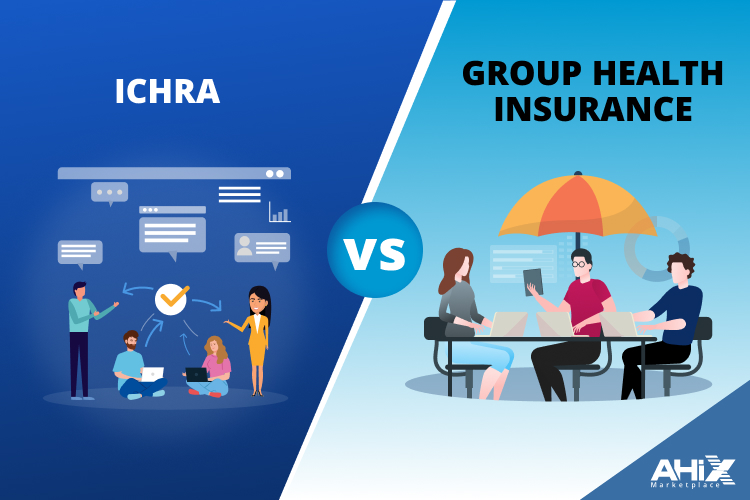Choosing the right employee health insurance can feel overwhelming, especially with so many new options for small businesses and employers to consider. One of the biggest shifts in recent years is the rise of the Individual Coverage Health Reimbursement Arrangement (ICHRA) , a flexible, defined contribution approach compared to traditional group health insurance, which follows the defined benefit model.
Understanding the differences between ICHRA vs group health insurance is essential if you want to control costs, stay compliant with the Affordable Care Act (ACA), and give your team quality coverage that meets their needs. Small business owners, HR managers, and remote teams all face unique challenges when balancing affordability, flexibility, and employee satisfaction.
In this guide, we’ll break down exactly how an ICHRA works, what a traditional group health plan includes, the pros and cons of each, and how to choose the best solution for your business. By the end, you’ll know whether a defined contribution health plan or a defined benefit group plan makes the most sense for your company and how to take the next step confidently.
What Is an ICHRA?
An Individual Coverage Health Reimbursement Arrangement (ICHRA) is a newer way for employers to offer health insurance that gives employees more freedom and flexibility. Instead of picking one group plan for everyone, a company using an ICHRA sets aside a defined contribution a fixed amount of money each month that employees can use to buy their own individual health insurance plan.
This approach is different from traditional group health insurance, which works like a defined benefit model: the employer chooses the plan and manages it for the whole team. With an ICHRA, each employee can choose the individual plan that fits their needs best whether that’s a certain network of doctors, special coverage for a family member, or a plan that travels with them if they move or work remotely.
An ICHRA can be a smart option for small businesses, companies with remote or multi-state workers, or any employer who wants more predictable health benefit costs. It’s also a good way to stay ACA compliant because when set up correctly, an ICHRA can satisfy the Affordable Care Act’s minimum essential coverage requirements.
In short, an ICHRA gives employers cost control while giving employees freedom to pick the health coverage that actually works for their lives. It’s an increasingly popular option for businesses looking to offer employee health insurance that’s flexible, tax-advantaged, and modern.
What Is Traditional Group Health Insurance?
Traditional group health insurance is the most common way employers have offered health benefits for decades. In this defined benefit model, the employer chooses a single group health plan from an insurance company and then offers it to all eligible employees and their dependents.
With a group plan, the company usually pays a large portion of the monthly premium often 50% to 80% while employees pay the remaining share through payroll deductions. This approach makes health coverage feel simple for employees because they don’t have to shop around for individual policies. Everything from plan options to networks and co-pays is decided by the employer and the insurance carrier together.
One big advantage of group health insurance is that it can help businesses attract and keep top talent by offering a solid employee health benefit package. It’s also a straightforward way to meet ACA compliance requirements for employers with 50 or more full-time workers. However, traditional group plans can be less flexible and more expensive for small businesses, especially if you have a mix of in-office and remote employees in different states.
When comparing ICHRA vs group health insurance, many companies realize they need to balance the predictability of a group plan with the flexibility that modern employees want. Understanding how a group plan works makes it easier to see whether switching to a defined contribution option like an ICHRA could help control costs and meet your team’s unique needs.
ICHRA vs Group Health Insurance Comparison
| Feature | ICHRA (Individual Coverage HRA) | Traditional Group Health Insurance |
|---|---|---|
| Plan Choice | Employees pick any ACA-compliant plan that fits their needs | Employer selects one plan (or a few options) for everyone |
| Cost Predictability | Employer sets a defined contribution amount (fixed reimbursement budget) | Premium costs can fluctuate year to year, less cost control |
| Defined Benefit vs Defined Contribution | Defined contribution model (control over budget) | Defined benefit model (coverage itself is the benefit) |
| Remote Workforce Fit | Great for remote or multi-state teams; employees choose plans available in their state | Less flexible for remote teams in different states |
| Employee Experience | Employees have freedom to choose plans based on personal/family needs | Simpler for employees no shopping required |
| Portability | Coverage stays with employee if they leave or move | Coverage ends when employee leaves the job |
| Compliance | Must meet ACA affordability and minimum value rules | Standard ACA-compliant coverage for applicable employers |
| Flexibility | Highly adaptable to a changing workforce | Lower more rigid plan options |
| Administration | May require extra education for employees to select plans | Straightforward enrollment through HR; less shopping around |
ICHRA Pros and Cons:

Understanding the pros and cons of an ICHRA can help employers decide if this modern, defined contribution health plan is a better fit than sticking with a traditional group health insurance model.
Key Benefits of ICHRA:
- Cost Control: Employers can set a fixed monthly budget, making health benefit costs more predictable.
- Employee Choice: Workers pick any ACA-compliant individual plan that works for their needs great for different family situations, health conditions, or doctor preferences.
- Remote & Multi-State Teams: An ICHRA works well for businesses with remote employees in multiple states, because each employee can choose plans available where they live.
- Tax Advantages: Both employers and employees can benefit from tax-free reimbursements when the ICHRA is properly designed.
Potential Drawbacks of ICHRA:
- More Employee Responsibility: Instead of enrolling in one employer-chosen plan, employees must shop for and manage their own individual health insurance.
- Administrative Learning Curve: Employers need to ensure their plan meets ACA compliance rules, like affordability and minimum value requirements.
- Education Needed: Employees may need support in understanding how to choose the right plan and use reimbursements effectively.
If you’re considering an ICHRA for your team, a resource like AHiX Marketplace can make it easier to compare individual health plans and guide employees through the selection process without feeling overwhelmed.
Pros and Cons of Group Health Insurance

Even with newer options like ICHRAs available, many employers still prefer the simplicity of traditional group health insurance especially for larger teams. Understanding the pros and cons helps you see whether sticking with this defined benefit plan is the right move for your business.
Key Advantages of Group Health Plans:
- Familiar & Easy: Employees don’t have to shop for plans; they simply enroll in the coverage you provide.
- Attract & Retain Talent: A strong employee health benefit package can help you stay competitive when hiring.
- Straightforward Enrollment: Group plans often come with built-in support from your broker or carrier for renewals and claims.
- Standard ACA Compliance: It’s an established way to meet Affordable Care Act requirements for employers with 50+ full-time employees.
Potential Drawbacks:
- Rising Premium Costs: Annual premium increases can be unpredictable, making it harder to manage budgets.
- Limited Employee Choice: One plan doesn’t fit everyone and employees may feel stuck with coverage that isn’t ideal for their needs.
- Less Flexibility for Remote Teams: If you have workers in multiple states, a single group plan might not cover everyone easily.
If you’re comparing ICHRA vs group health insurance, think about how important flexibility, cost control, and employee choice are for your team. A trusted resource like AHiX Marketplace can help you explore both options and see which aligns best with your goals.
How to Choose: ICHRA vs Group Health Insurance

Choosing between an ICHRA and a traditional group health insurance plan isn’t about which option is “better” , it’s about which one fits your team’s needs, budget, and goals best. Here are a few key questions to help you decide:
1. Company Size & Budget:
If you’re a small business or a growing company that wants to control costs, an ICHRA can offer clear, predictable budgeting with a defined contribution. Larger companies with stable budgets might prefer the familiarity of a defined benefit group plan.
2. Workforce Location:
Do you have employees working remotely or in multiple states? An ICHRA is often more flexible because it lets each employee choose coverage available in their area. Traditional group health plans can be more limited for multi-state teams.
3. Employee Preferences:
Some employees love the freedom of picking their own plan through an ICHRA, while others prefer the simplicity of automatic enrollment in a group plan. Consider how much guidance and support your team will need.
4. Compliance & Admin:
Both options can help you meet ACA compliance, but an ICHRA can require extra education to make sure employees understand how to shop for plans. If your HR team is ready for that, it can be a great fit.
5. Future Flexibility:
Think long term: as your company grows, will you want the flexibility to adjust budgets, expand to new states, or adapt benefits to a changing workforce?
If you’re unsure which way to go, AHiX Marketplace makes it easier to compare health insurance options side by side so you can choose a plan strategy that protects your people and your bottom line.
Final Thoughts & Next Steps
When it comes to offering employee health insurance, there’s no one-size-fits-all answer. Both an ICHRA and a traditional group health insurance plan can help you take care of your team, attract talent, and stay ACA compliant but each works best in different situations.
An ICHRA gives you predictable costs and gives employees freedom to choose plans that fit their unique needs, which is great for small businesses, remote teams, or companies in multiple states. A group plan is straightforward and familiar, making it easy for employees to enroll without shopping around.
If you’re not sure which approach is right for your business, don’t stress. AHiX Marketplace makes it simple to compare ICHRA vs group health insurance options side by side. You’ll get the clarity you need to choose the right plan strategy for your budget, your team, and your future.
FAQs:
1. What’s the biggest difference between ICHRA and group health insurance?
The main difference is plan choice. An ICHRA lets employees choose their own individual health plan and get reimbursed, while a group health plan means the employer picks one plan for everyone.
2. Can a small business offer ICHRA and group health insurance at the same time?
Yes, employers can offer both options, but not to the same group of employees. You must separate employee classes clearly and follow IRS rules to stay compliant.
3. Is an ICHRA good for companies with remote employees?
Yes. An ICHRA works well for remote or multi-state teams because employees can pick a plan available where they live, making benefits more flexible.
4. Do employees pay taxes on ICHRA reimbursements?
No. As long as the ICHRA is set up properly and used for eligible expenses, reimbursements are tax-free for employees and the business.
5. What happens if an employee’s plan costs more than the ICHRA allowance?
If the health insurance premium is higher than the employer’s defined contribution, the employee pays the extra amount themselves.
6. Can a part-time employee qualify for an ICHRA?
Yes. Employers can offer ICHRAs to part-time, seasonal, or different classes of workers, but they must follow IRS rules for how employee classes are defined.
7. Is an ICHRA better than giving employees a cash stipend?
Generally, yes. An ICHRA is tax-free for both employers and employees when used correctly, while a cash stipend counts as taxable income for the employee.
8. Can a business switch from group health insurance to ICHRA mid-year?
Yes. When an employer offers an ICHRA, it triggers a Special Enrollment Period (SEP) for employees. This allows them to leave their group plan and enroll in individual health coverage outside of the standard Open Enrollment period.
9. Who handles the paperwork for ICHRA reimbursements?
Employers can manage reimbursements themselves, but most use a third-party administrator or trusted marketplace to verify coverage and handle payments.



